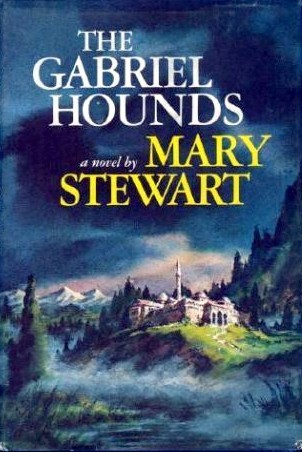 The Gabriel Hounds by Mary Stewart
The Gabriel Hounds by Mary Stewart Published by William Morrow on 1967
Genres: Romantic suspense
Pages: 244
Format: Hardcover
Source: my personal collection
Add to Goodreads

Also by this author: Airs Above the Ground, This Rough Magic, Nine Coaches Waiting
It's all a grand adventure when English Christy Mansel unexpectedly runs into her cousin Charles in Damascus. And being young, rich, impetuous, and used to doing whatever they please, they decide to barge in uninvited on their eccentric Great-Aunt Harriet—despite a long-standing family rule strictly forbidding unannounced visits. Because when the Gabriel hounds run howling over the crumbling palace of Der Ibrahim in the Lebanon, someone will shortly die.
A strange new world awaits Charles and Christy beyond the gates of Dar Ibrahim—"Lady Harriet's" ancient, crumbling palace in High Lebanon—where a physician is always in residence and a handful of Arab servants attends to the odd old woman's every need. But there is a very good—very sinister—reason why guests are not welcome at Dar Ibrahim. And the young cousins are about to discover that, as difficult as it is to break into the dark, imposing edifice, it may prove even harder still to escape.
Review
I must have been in high school when I first read The Gabriel Hounds, which puts that first reading somewhere in the late 1970s, or about a decade after the book was published. Even then, it was a little dated – social mores and beliefs changed so dramatically in the 1960s and ’70s, especially regarding women’s rights and abilities. Yet the book’s exotic setting (for a young American girl whose only foray abroad had been to Great Britain) and the heady mix of suspense and romance combined with my admiration for the heroine’s relative independence had me falling headlong in love with the book. (I had already fallen in love with the author; by the time I read The Gabriel Hounds I had already read Nine Coaches Waiting and at least one other suspense novel, plus the first two in her Arthurian saga.)
More than 35 years later, I find I still enjoy the book and its setting. Lebanon’s Adonis Valley (the Ibrahim River valley), where much of the book takes place, is still fairly rural as far as I can tell from maps and photographs. Dar Ibrahim, the half-ruined palace where Christy and Charles’s Great Aunt Harriet plays a Lady Hester Stanhope role, never existed except in the author’s imagination, but it is a magical place, perhaps all the more so for being run down and falling to bits. Stewart’s gift for description is very much in evidence, bringing the heat and light of a desert land, the bewildering bustle of a Damascus souk, and the decaying glories of Dar Ibrahim to vivid life.
Christy, the first-person narrator and heroine of the book, is intelligent and educated like all of Stewart’s heroines, but she’s not quite as savvy. Perhaps it’s only inexperience and naivite; she is also a little younger and certainly had a more sheltered life than most of the others (I’m thinking here particularly of Charity in Madam Will You Talk, Mary Grey in The Ivy Tree, and Vanessa of Airs Above the Ground.) That inexperience leads her to make at least one disastrous decision in the course of the story; it’s not quite a TSTL moment, but it comes close. Still, when things come to a crisis Christy generally keeps her head. She’s no shrinking violet, either; she’s got nerve as well as a fair amount of the confident arrogance that comes with wealth and privilege. That’s not a particularly admirable trait, but Christy is aware of it and makes conscious use of it when it suits her to do so; the rest of the time she comes across as neither spoiled nor arrogant. Her enthusiasm and sense of humor keep her from taking herself too seriously; all in all, she’s both likable and charming.
Although he’s nearly the same age as Christy, her second cousin Charles is clearly more experienced in the ways of the world – I would say street-smart, except it’s more sophisticated than that. He shares with Christy the familial arrogance, but also the same clear-eyed self-knowledge, tempered with a somewhat ironic sense of humor, and of course he’s handsome, with that long-limbed grace so common among the British upper class.
As always, Stewart keeps the romance subtle, perhaps the more so in this case because Christy and Charles already know each other so well, having literally grown up together. For much of the book, it’s there only in hints or fleeting moments of awareness; most of the time, the two of them banter and tease each other with the easy familiarity of cousins:
“We always did go for the same things, didn’t we–or maybe you’d say I tagged along where you went. . . ? I’d always had vaguely romantic ideas about Petra and Damascus and Palmyra, but never thought about coming here; then I saw the advert for this package tour, so I thought I’d join up, find my way about, then stay on after they’d gone and take my time filling in a few extras. One of them was Djoun, Lady Hester Stanhope’s place.”
“It’s a ruin now.”
“I know, but I still thought I’d like to see it. She was quite a girl, wasn’t she? I read everything you had about her, and nice snappy reading it was, compared with some of those tomes of yours. I had flu just after Christmas and was stuck indoors for a fortnight, and Mummy hadn’t time to rake round the bookshops for something more my weight.”
He grinned, undeceived. “Don’t work so hard at not being clever. I’m not one of your muscle-bound blonds.”
“Neither you are,” I said.
Our eyes met. There was a tiny silence, in which the fountain sounded oddly loud.
Suspense is very much to the fore once Christy actually gains entrance to Dar Ibrahim. Even before her interview with her great-aunt, it’s clear that something’s not quite right with the whole setup. Just what is wrong, and how badly, will come as a surprise to the first-time reader, especially since there’s one critical bit of information that Christy (and therefore the reader) is lacking. Stewart builds tension and a sense of danger with unerring skill, culminating in a series of scenes that would make spectacular watching if this book were ever adapted for the screen.
I mentioned that the book is slightly dated, something which is evident in many characters’ attitudes toward women. I hasten to point out that Stewart’s heroines themselves are unusual in their intelligence and independence. The “gothic” genre which preceded Stewart’s books (and indeed, continued alongside them) usually featured sweet, innocent, vulnerable girls who frequently lean toward the TSTL (too stupid to live) trope and have to be rescued by the hero. In contrast, Stewart’s heroines are refreshingly – surprisingly – levelheaded and resourceful, and if there’s any rescuing needed, it’s often reciprocal. But there are still hints of more traditional attitudes even within her heroines’ own thoughts. Perhaps that’s inevitable, and it’s certainly consistent with how a relatively “modern” young woman of that time period would feel, but some readers may find it mildly annoying.
In this book and those set in Greece, there’s also a slight touch of that British sense of national superiority, particularly over peoples who are not Western European. It’s obviously not conscious on Stewart’s part, and in fact she clearly tries to avoid it in both her narrative and in her sympathetic characters. She’s aware of her contemporary countrymen’s racism and lingering colonial mindset; it’s often a facet of her unsympathetic characters, whether villains or merely unpleasant people. But I think she remained unaware of a slight tendency in herself to romanticize or stereotype the Other, even in positive portrayals. Again, context is key: she’s surprisingly un-racist for someone born in 1916, when the British Empire was still at its height. Modern readers should bear that in mind.
Stewart’s books are still available: Rediscovered Classics (Chicago Review Press) has reprinted a number of them over the last 10 years, and those are still in print. Oddly, they don’t seem to be available as ebooks at the moment, at least in the U.S. You can probably find some titles at your local library, and it’s certainly easy to find used copies online. If you enjoy romantic suspense, I hope you’ll give Stewart a try.


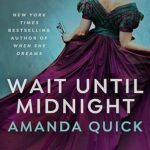


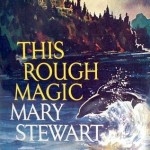






























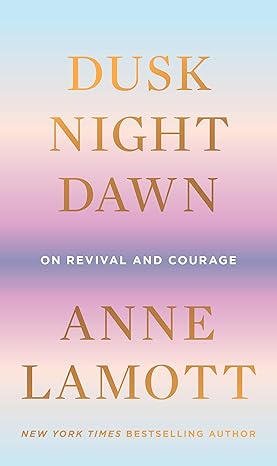
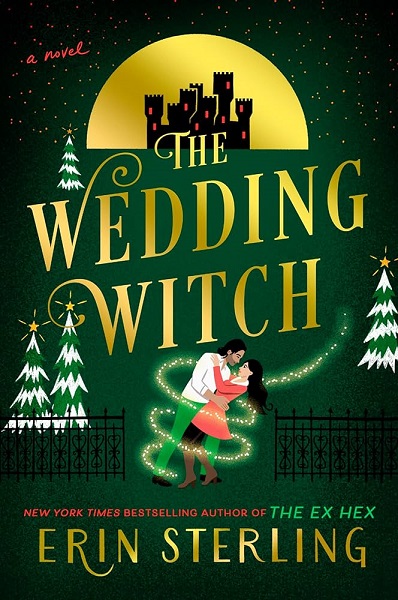









Lark
This isn’t my favorite Mary Stewart book, but I still like it, mostly because I like Christy. I just wish Stewart had written more books! She’s such a good author.
Lark recently posted…Be Happy!
Lark_Bookwyrm
I wish there were more Stewarts, too.
Rita @ View From My Home
I used to read Mary Stewart, Phyllis Whitney, Victoria Holt, and a few others of a similar ilk in my teen years. I did read this Stewart one when I was like 15-17 or so, and don’t remember much except the title, unfortunately.
I am now slowly savoring (just means going to take awhile to read it, lol) The Shadow of the Lynx by V. Holt.
Yes, many gothics featured women as TSTL decision-makers, and in need of a man’s strong shoulder. That was a view of the times, which was still waiting to change for females, and also the genre’s style.
Thanks for a good review!
Rita @ View From My Home recently posted…Weekly Wrap-Up: 3/5/16
Lark_Bookwyrm
I read Whitney and Holt as a teen, too, and enjoyed them for a while. As I got into college, I began to relate less and less to the heroines, I think. But I’ve thought about going back and giving one or two of the ones I liked best a re-read.
Bea @Bea's Book Nook
I also read Mary Stewart, Phyllis Whitney, Victoria Holt, etc. as a teen though I don’t recall if I read this one. I did read and love her Arthurian saga, which IS available in ebook. 🙂 I really need to get some of her RS books and read or reread them, see if I still like them.
Good review, especially about the change in attitudes and perspectives.
Bea @Bea’s Book Nook recently posted…Cat Thursday: New Olympic Sport
Lark_Bookwyrm
Thank you, Bea! Yes, I loved the Arthurian saga, or at least the first two. I wasn’t as thrilled with the third book, but I should go back and reread it.